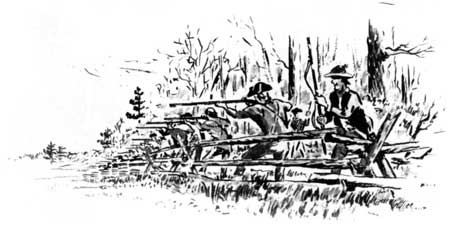|
GUILFORD COURTHOUSE National Military Park |
 |
Attack on the First Line
Their formation now completed, the British troops waited for the command to attack. At its word they moved almost directly east toward the brow of the hill held by the Americans. Brisk fighting ensued on the two flanks, where Greene had stationed his experienced troops. This flank resistance forced the commander of each of the two British wings to commit his small support to the battle in its earliest stages. Gen. Alexander Leslie, on the right, brought up the 1st Battalion of the Guards to assist in opposing the American left, and thus extended his own line. On the British left Lt. Col. James Webster caused his whole line to incline to the left, while his support, the 2d Battalion and Grenadiers of the Guards, moved into the center to maintain contact with the right wing and fill the interval caused by Webster's swerve to the left. The Light Infantry and Yagers were brought up from the reserve and posted on the extreme left flank. Many casualties were suffered by the British, especially by the flank units, but the center encountered little resistance, for that part of the American line, in large measure, broke at the first onset.
The American left flank detachment under Lee and Campbell retired toward the southeast under pressure from the Regiment of Bose and the 1st Battalion of the Guards. Continuing their struggle, these units became completely detached from the main course of the engagement, conducting what amounted to a separate conflict of their own. This battle within a battle was finally broken off by the Americans at about the same time that the main engagement ended.
The exact course of the American right flank detachment is unknown. It seems most probable that it briefly took position on the flank of the second line; and, upon the retirement of that body, moved thence to the flank of the third.

North Carolina Militia in the First Line.

|
|
Last Modified: Mon, Dec 2 2002 10:00:00 am PDT |


